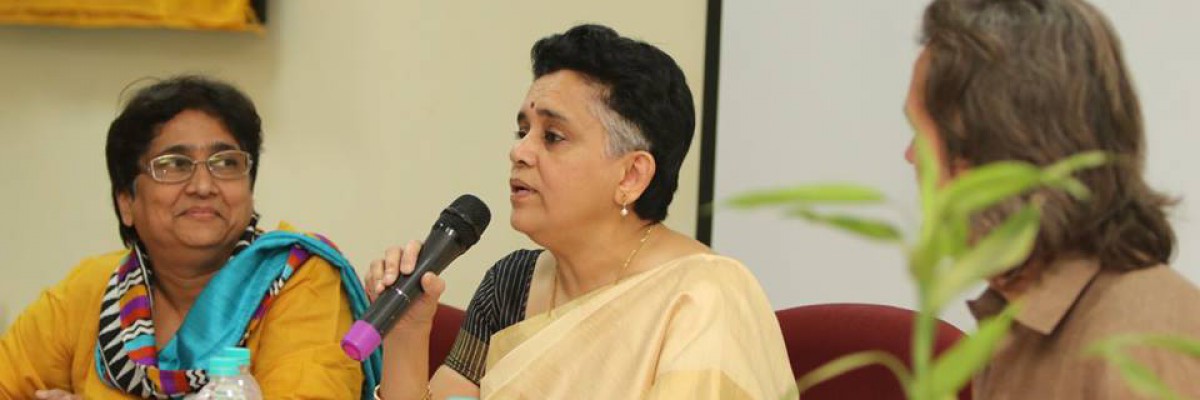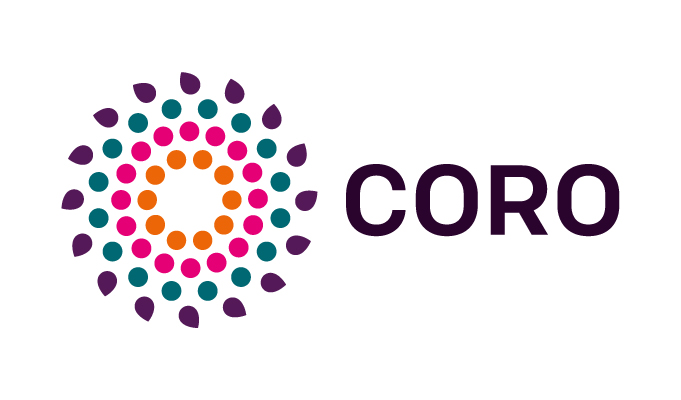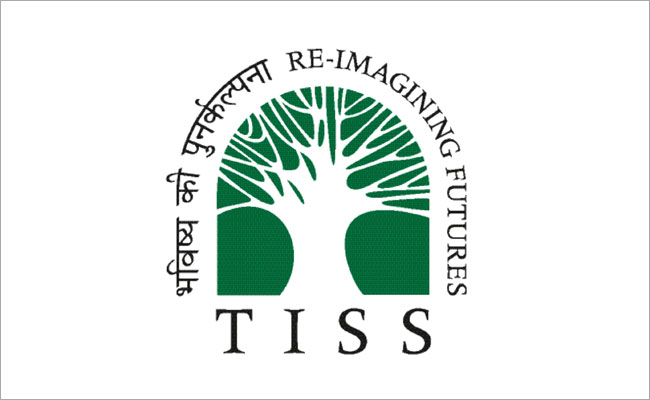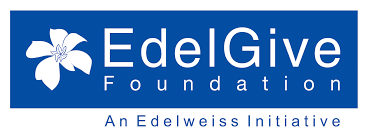
Session 1: Interrogating Collective Knowledge Building Processes: University and Community
This session revolved around understanding the context, tools, and limitations that inform the various stages of the knowledge-building process. Different contexts and communities require adaptations of the processes of knowledge building to best foster mutual and inclusive learning and true dialogue. Particularly of import is examining the disparity between the value given to knowledge generated within elite, academic spaces as opposed to informal grassroots communities. Therefore, when research is initiated from elite spaces but conducted in marginalized communities, the limitations must be considered along with the best possible approaches and methodologies to manage the power imbalance. Self-reflexivity and iterative learning are examples of such strategies that can be applied across the various stages of gathering and producing knowledge.
Presenters:
- Sujata Khandekar, Pallavi Palav and Anwari Khan (CORO India)
- Dr. Sudha Premnath (Kaigal Conservation)
- Apoorv Avram and Aditya Saran (Thinkinwords)
- Bhavya Chitranshi and Mami Pedenti (Eka Nari Sanghathan, Ragaida Odisha)
Discussant:
Prof. Lakshmi Lingam (Tata Institute of Social Sciences)
“Flipping the Hierarchy of Researcher and Researched”
Sujata Khandekar, Pallavi Palav and Anwari Khan (CORO India)
Sujata Khandekar conducted a cooperative, feminist inquiry with 8 co-researchers from a wide variety of social strata that was mutually conceptualized, conducted and analyzed. At the outset of the research, the co-researchers thought that they would be case studies within the research, but over the course of the intensive process it morphed into a mutually ownership due to the closely-held core elements of trust, non-threatening attitudes, and openness.
Many of the co-researchers come from marginalised backgrounds and were associated with social developmental work through CORO. Therefore, they have considerable experience with outsiders asking about and intervening with their lives. These were always unilateral interactions, as those attempting interventions would not share their own stories or personal feelings in return. Through the research methodology of feminist cooperative inquiry, the co-researchers conscientiously broke down the barriers of sex, gender, caste, class, religion to form a mutual basis of trust and friendship that transcended beyond the norms for such research studies. Through living together over several days and having in-depth one-on-one and group interviews, the co-researchers analyzed the trajectory of their journey from oppression to independence, and the trigger points that led them to becoming knowledge-builders.
Particularly crucial to the process was the innovative pre-research period. This innovative approach focused on understanding the self and forming self-confidence as a knowledge-builder. Only by first working on affirming all the co-researchers’ self-confidence as co-researchers could the main research inquiry be conducted in earnest.
“Communities for conservation and livelihood: A Case Study from Kaigal”
Sudha Premnath (Kaigal Conservation, Andhra Pradesh)
In the context of communities embedded in and dependent on forest ecosystems, it has long been understood that there is a dialectic between community-based conservation approaches and restoring ecosystems for building sustainable and self-reliant communities. The role of knowledge – access, creation and application – is centrally implicated in such a development process, especially so in today’s society defined by data and information flows, and the inequities they bring.
It is in this context that the Kaigal Education and Environment program has been conceptualized and implemented. The program began in 2003 near the Kaigal village, in the Palamner Ghats on the fringes of the Kaundinya Wildlife Sanctuary (KWS), the only elephant sanctuary in Andhra Pradesh. The tribal people here largely depend on the forests from where they collect a large variety of non-timber forest produce. These tribal communities here are knowledge holders on various aspects including local biodiversity, traditional healing and forest management practices. The local population also consists of marginal and small farmers, shepherds and daily wage earners belonging to the most backward communities.
Keeping the community at the centre of its efforts, the program adopted an integrated approach of biodiversity documentation and habitat restoration. The program worked with the community elders and local healers to identify endangered species, locally important species and worked towards conservation and documentation, building a germ plasm and forest nursery. Led by community interest, schools were established in these tribal villages which sought to combine the formal mainstream education with the knowledge of local biodiversity. Another focus area was skill building of the local communities in collection, value addition and selling of products based on bioresources, to support and continue sustainable forest management practices.
This has resulted in the regeneration of many endangered species, capacity building and skill building of local communities and formation of biodiversity management committees in local panchayats. The program has worked with state and national level institutions in bringing together local communities and contributing to collective knowledge building. The community run local enterprise has been able to demonstrate a possible model for sustainable forest management and sharing of bioresources.
“Deliberative Persuasion: An Under-Examined Source of Inequality in Collaborative Knowledge-Building”
Apoorv Avram and Aditya Sarin (Thinkinwords)
Collaborative knowledge-building projects have made a strong attempt to create spaces for equal intellectual engagement. Indeed, the value of such projects is contingent on the establishment of this equality to increase heterogeneity in participation, allowing voice to historically excluded positions. While robust attempts have been made to classify and defuse inequalities of social capital in collaborative spaces, there exists another, invisible, source of potential inequality: the difference between participants’ own abilities of deliberative persuasion.
Deliberative persuasion is the ability to use reasons to convince others in a discussion of the correctness of one’s position. This ability is unequally distributed and non-reducible to other forms of social capital, such as linguistic fluency, knowledge of the issue, and social authority. As such, existing checks and balances against these inequalities fail to curtail the ill-effects of differences in persuasive ability. Participants can, therefore, employ their persuasive abilities to disproportionately influence epistemic outcomes.
Processes for inclusive knowledge-building must allow for participants without strong persuasive abilities, and the positions they represent, to be protected and provided sufficient opportunity to influence outcomes. The non-recognition of deliberative persuasion as a possible threat to the process, we argue, is not a function of ignorance of its existence as much as a problematically uncritical valorisation of its role in knowledge-building. Deliberative Democracy, for example, has been at the forefront of political theory in recent years. It espouses a model for direct engagement between citizens to discuss and achieve consensus on policy issues, with a strong emphasis on the reconciliation of divergent opinions and backgrounds. However, even such a welcoming space designed to maximise participation across social categories allows the influence of persuasion to exist unchecked. Indeed, deliberative persuasion is considered the ideal medium of knowledge-building, despite the unequal ease participants may have with it. Further, these abilities aren’t necessarily proportionate to the value of the positions they represent, so some participants can shape consensus for no other reason than that their persuasive abilities allow them to.
Deliberative persuasion is distinct from other forms of social capital, collaborative knowledge-building endeavours are adversely affected by differences in deliberative persuasive abilities, and such inequalities must be identified and worked upon to mitigate their effects.
“Eka Nari Sanghathan: Towards a collective journey of transformation”
Bhavya Chitranshi (Centre for Development Practice, Ambedkar University Delhi) and Mami Pedenti (Eka Nari Sanghathan, Rayagada Odisha)
This work began 5 years ago with the mobilization and collectivization of Kondha adivasi women around the issue of singleness in the Rayagada district of Odisha. The collective articulation and analysis of the condition of singleness among women helped us arrive at a two-fold understanding of singleness: (a) singleness as a condition depicting loneliness, including economic, political and cultural othering and exclusion, and the everyday life of a woman subjected to varied forms of socio-political discriminations and violence, and (b) as also a condition that has enabled women to lead at least a negotiated gendered existence in comparison to women under the direct control of the hetero-patriarchal institution of marriage. The two-fold understanding of singleness is also tied to a discursive shift we made from singlehood (as a marker of a woman’s identity; such as the identity of a widowed, separated, never-married woman) to singleness (as a lived experience in the absence or even in the presence of a male sexual partner – more as a ‘contingent emergent subject position’).
This work largely at the interface of being single, being ‘woman’, and being adivasi has been engaging with questions around transformative praxis that take us beyond the hegemonic practices of state and capital-centric development and given perspectives around class struggle and feminist politics. This work since its inception has been arguing for a critical engagement with existing (somewhat under-theorized) discourses and practices in development that present rural adivasi spaces as poor, backward and as third world spaces in dire need of modernization and which foreground adivasi women as poor ‘victims’ and beneficiaries lacking in resources, knowledge, cognizance and capability to change their condition. Women are collected into groups to promote micro-finance, livelihoods and other so called “developmental agendas” that claim to “empower” them, but the ‘reality’ of their lived life and their nodal experiences is largely kept outside of these interventions.The aim although is not to create replicable, generalizable ‘models’ but to think about ‘alternative’ collective spaces that can open up the scope and possibility of transformative work for future. It is towards this newer and collaborative learnings, common becomings, deeper bondings, and transformative futures attempts to be working.



